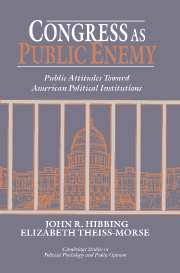Book contents
- Frontmatter
- Contents
- List of figures
- List of tables
- Preface
- CONGRESS AS PUBLIC ENEMY
- 1 Introduction: What is wrong with the American political system?
- 2 Changing levels of support for individual institutions
- 3 Perceptions of political institutions
- 4 Perceptions of congressional features and reforms
- 5 Focus groups and perceptions of the Washington system
- 6 Who approves of Congress?
- 7 Support for democratic processes
- 8 Conclusion: The people and their political system
- Appendix
- References
- Index
6 - Who approves of Congress?
Published online by Cambridge University Press: 05 August 2012
- Frontmatter
- Contents
- List of figures
- List of tables
- Preface
- CONGRESS AS PUBLIC ENEMY
- 1 Introduction: What is wrong with the American political system?
- 2 Changing levels of support for individual institutions
- 3 Perceptions of political institutions
- 4 Perceptions of congressional features and reforms
- 5 Focus groups and perceptions of the Washington system
- 6 Who approves of Congress?
- 7 Support for democratic processes
- 8 Conclusion: The people and their political system
- Appendix
- References
- Index
Summary
Conversations among focus-group participants highlight the fact that while disgust with Congress is widespread, people differ in their actual level of support and in the reasons behind their evaluations of Congress. These focus-group results provide important clues to ascertaining why the public mood is so negative, but we need to go one step farther to determine the precise identities of Congress's supporters and detractors. We therefore return to our national survey to examine systematically variations in public approval of Congress, and to explain what about Congress the public dislikes and, occasionally, likes.
CONGRESS EQUALS THE MEMBERS OF CONGRESS
Who approves of Congress depends upon what is meant by “Congress.” As we have stressed repeatedly, Congress can be seen as a collection of 535 individuals or as a political institution that is quite detached from such ephemeral features as the current membership composition. We now know that only 24 percent of the population approve of Congress the collection of members, whereas 88 percent approve of Congress the permanent institution. But this tremendous difference in mean approval says nothing of the kinds of people who are more likely to approve or disapprove. Just who are the unusual creatures who actually approve of the membership of Congress? Who are the even more unusual creatures who disapprove of the institution of Congress? Do the same traits explain variation in support for the members and for the institution?
We shall answer these questions shortly, but first we must address an intriguing question that helps to clarify our argument.
- Type
- Chapter
- Information
- Congress as Public EnemyPublic Attitudes toward American Political Institutions, pp. 106 - 124Publisher: Cambridge University PressPrint publication year: 1995

